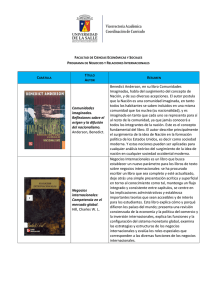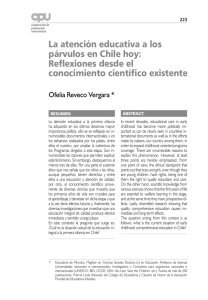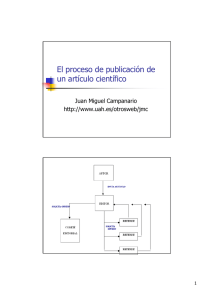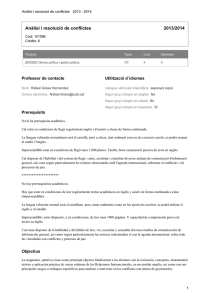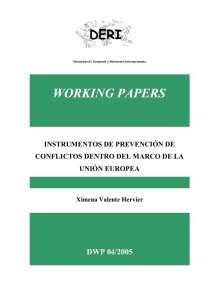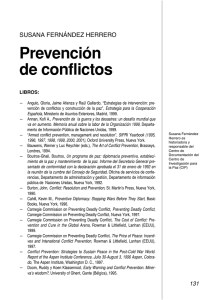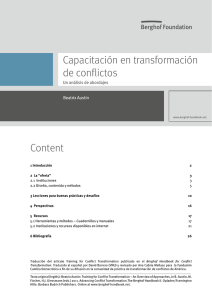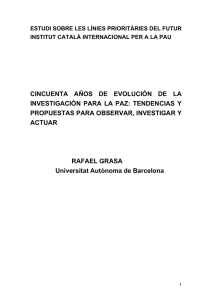ANÁLISIS DEL SIGNIFICADO DE CONFLICTO EN UN GRUPO
Anuncio
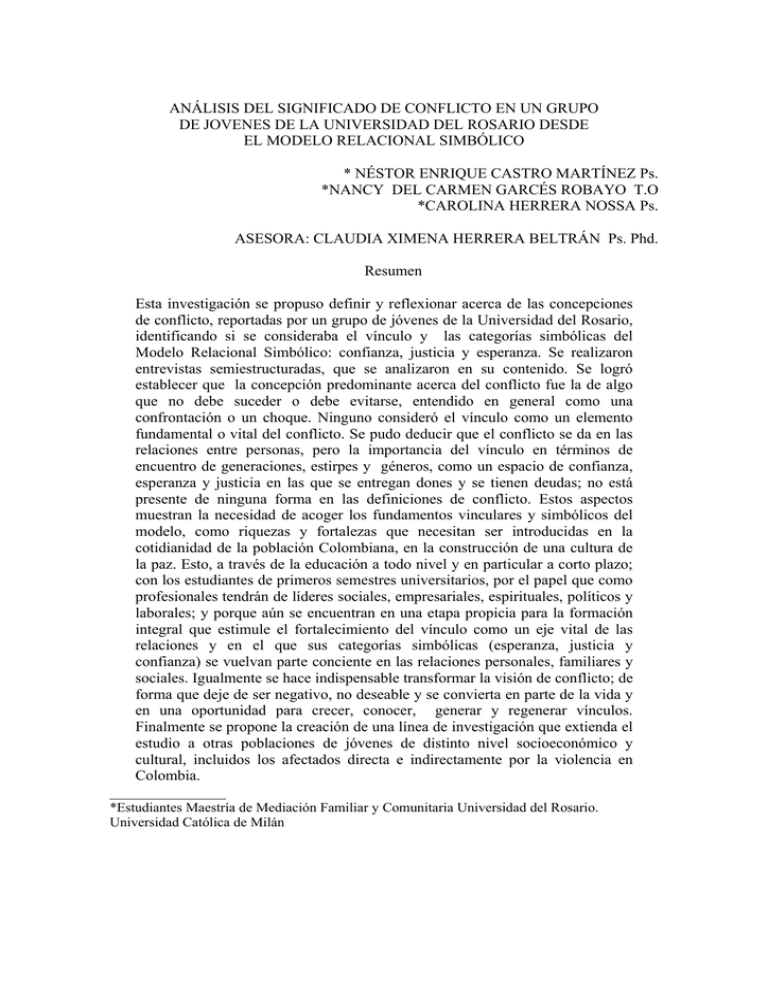
ANÁLISIS DEL SIGNIFICADO DE CONFLICTO EN UN GRUPO DE JOVENES DE LA UNIVERSIDAD DEL ROSARIO DESDE EL MODELO RELACIONAL SIMBÓLICO * NÉSTOR ENRIQUE CASTRO MARTÍNEZ Ps. *NANCY DEL CARMEN GARCÉS ROBAYO T.O *CAROLINA HERRERA NOSSA Ps. ASESORA: CLAUDIA XIMENA HERRERA BELTRÁN Ps. Phd. Resumen Esta investigación se propuso definir y reflexionar acerca de las concepciones de conflicto, reportadas por un grupo de jóvenes de la Universidad del Rosario, identificando si se consideraba el vínculo y las categorías simbólicas del Modelo Relacional Simbólico: confianza, justicia y esperanza. Se realizaron entrevistas semiestructuradas, que se analizaron en su contenido. Se logró establecer que la concepción predominante acerca del conflicto fue la de algo que no debe suceder o debe evitarse, entendido en general como una confrontación o un choque. Ninguno consideró el vínculo como un elemento fundamental o vital del conflicto. Se pudo deducir que el conflicto se da en las relaciones entre personas, pero la importancia del vínculo en términos de encuentro de generaciones, estirpes y géneros, como un espacio de confianza, esperanza y justicia en las que se entregan dones y se tienen deudas; no está presente de ninguna forma en las definiciones de conflicto. Estos aspectos muestran la necesidad de acoger los fundamentos vinculares y simbólicos del modelo, como riquezas y fortalezas que necesitan ser introducidas en la cotidianidad de la población Colombiana, en la construcción de una cultura de la paz. Esto, a través de la educación a todo nivel y en particular a corto plazo; con los estudiantes de primeros semestres universitarios, por el papel que como profesionales tendrán de líderes sociales, empresariales, espirituales, políticos y laborales; y porque aún se encuentran en una etapa propicia para la formación integral que estimule el fortalecimiento del vínculo como un eje vital de las relaciones y en el que sus categorías simbólicas (esperanza, justicia y confianza) se vuelvan parte conciente en las relaciones personales, familiares y sociales. Igualmente se hace indispensable transformar la visión de conflicto; de forma que deje de ser negativo, no deseable y se convierta en parte de la vida y en una oportunidad para crecer, conocer, generar y regenerar vínculos. Finalmente se propone la creación de una línea de investigación que extienda el estudio a otras poblaciones de jóvenes de distinto nivel socioeconómico y cultural, incluidos los afectados directa e indirectamente por la violencia en Colombia. _______________ *Estudiantes Maestría de Mediación Familiar y Comunitaria Universidad del Rosario. Universidad Católica de Milán ANALYSIS OF THE MEANING OF CONFLICT IN A GROUP OF YOUNG PEOPLE AT THE UNIVERSIDAD DEL ROSARIO SEEING FROM THE RELATIONAL SYMBOLIC MODEL * NÉSTOR ENRIQUE CASTRO MARTÍNEZ *NANCY DEL CARMEN GARCÉS ROBAYO *CAROLINA HERRERA NOSSA Advisor: CLAUDIA XIMENA HERRERA BELTRÁN Ps. Phd. Summary This investigation’s purpose is to define and reflect about conflict conceptions as reported by a group of young people from the Universidad del Rosario identifying if they consider the bond and symbolic categories of Relational Symbolic Model: confidence, justice and hope. Semi-structure interviews were done which were analyzed in their content. It could be established that the predominant conception about conflict was that it is something that must not happen or must be avoided. In general, conflict is understood as a confrontation or clash. Nobody considered the bond as a fundamental or vital element of conflict. It could be concluded that conflict is a given in people’s relationships. The importance of the bond in terms of generational encounters, lineage, genres, a comfort zone, and a hope and justice area where gifts are given and moral compromises had is not present in any conflict definitions. These aspects show the necessity to admit the bond and symbolic fundamentals of the model, as values and strengths that must be introduced within the daily life of the Colombian population for the construction of a peaceful culture. This is done through education in all layers in a short term with early semester students because of the role they will have as professionals. They would be social, business, spiritual, politics and work leaders. These students are in a propitious stage for a comprehensive education which stimulate and strengthen the bond as a vital crux of relationships with its symbolic categories (hope, justice and confidence). This bond should become a conscious part of personal, familiar and social relationships. This could be indispensable to transform the vision of conflict, in such way that it stops to be negative, not desired. Instead of this, it should become a part of life with an opportunity to grow, know, generate and regenerate bonds. Finally, the creation of a research line is proposed that extends the research to other populations of young people of different social-economic and cultural backgrounds, including those who have been affected directly or indirectly by the Colombian violence. *Students of Familiar and Community Mediation Master University of Rosario. Catholic University of Milan.
